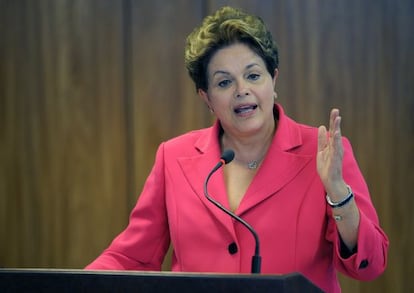Brazil’s biggest bribery trial opens
Party officials connected to Lula da Silva are accused of political payoffs


Following seven years of investigations, one of the biggest corruption trials in the history of Brazil will open before the Supreme Court on Thursday, with nearly 40 people charged with using public money to pay monthly bribes to lawmakers during President Luiz Inácio Lula Da Silva’s first term.
Attorney General Roberto Gurgel told the Supreme Court in a filing that the so-called mensalão case was “the most daring, outrageous corruption scheme and embezzlement of public funds ever seen in Brazil.”
According to the police investigation, the conspiracy, which was made up by members in Lula Da Silva’s government and his ruling Workers Party (PT), used 101 million reals (or 50 million euros) of public money, which went to other parties and lawmakers so that they would agree to support the leftist government in the National Congress. The bribes were allegedly paid on a monthly basis — hence the name of the case: mensalão.
The allegations rocked Lula Da Silva’s first term in office, although the president has so far not been dragged into the scandal. There was no strong evidence that he knew or participated in the alleged scheme.
A record number of defendants — 38 people — plus a 50,000-page case file and more than 600 witnesses make up the mammoth inquiry.
One of the main defendants is a former chief of staff to Lula Da Silva
But the trial could have some important implications concerning Brazil’s political future. One of the main defendants is José Dirceu, a former chief of staff to Lula Da Silva and one of his top advisors, who was also at one time considered to be his successor. According to police, Dirceu was the head of the conspiracy.
Besides Dirceu, the entire PT upper echelon will also go on trial, including the party president and vice president.
Lula Da Silva had initially maintained that the mensalão never existed and that the allegations had been fabricated by the opposition. But after the case began to develop and more evidence was presented, Lula Da Silva appeared on national television in 2005 to tell Brazilians he felt “deceived” by some in his party and asked the country for forgiveness.
In summarizing the case, Gurgel wrote that “a substantial amount of evidence was collected, which leaves no doubt the allegations have basis.”
Of the 11 justices that will preside over the trial, eight were appointed by Lula Da Silva and two by the current president, Dilma Rousseff.
Lula Da Silva was accused of trying to influence the case by attempting to blackmail one of the judges as a means of pressuring the magistrate to delay the trial until the statute of limitations ran out on many of the most serious charges.
The final verdict will in some way be a sentence or an acquittal for Lula Da Silva and his PT party. But it will also affect Rousseff’s chances for reelection if Dirceu is acquitted. According to analysts, he has always seen himself as Lula Da Silva’s successor and considers Rousseff his political arch enemy.
The court, meanwhile, finds itself in a difficult position. If they condemn Dirceu and the other defendants, they will be condemning Lula Da Silva’s legacy and party. At the same time, acquittals could also reflect badly on the court with the public believing that the judicial process was tainted.
The trial is expected to last until September.
Tu suscripción se está usando en otro dispositivo
¿Quieres añadir otro usuario a tu suscripción?
Si continúas leyendo en este dispositivo, no se podrá leer en el otro.
FlechaTu suscripción se está usando en otro dispositivo y solo puedes acceder a EL PAÍS desde un dispositivo a la vez.
Si quieres compartir tu cuenta, cambia tu suscripción a la modalidad Premium, así podrás añadir otro usuario. Cada uno accederá con su propia cuenta de email, lo que os permitirá personalizar vuestra experiencia en EL PAÍS.
¿Tienes una suscripción de empresa? Accede aquí para contratar más cuentas.
En el caso de no saber quién está usando tu cuenta, te recomendamos cambiar tu contraseña aquí.
Si decides continuar compartiendo tu cuenta, este mensaje se mostrará en tu dispositivo y en el de la otra persona que está usando tu cuenta de forma indefinida, afectando a tu experiencia de lectura. Puedes consultar aquí los términos y condiciones de la suscripción digital.








































